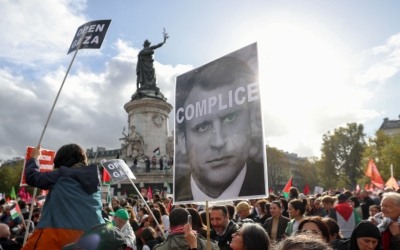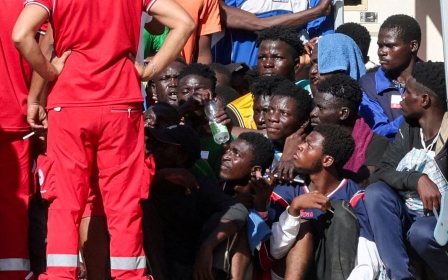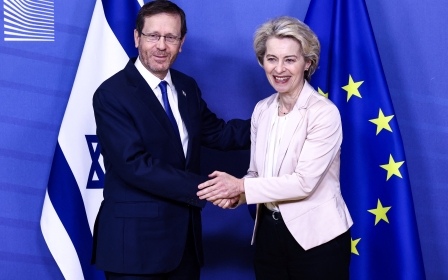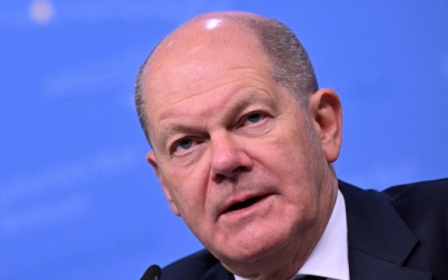Israel-Palestine war: Gaza displacement could trigger refugee crisis in Europe, analyst warns

The war in Gaza could trigger a new wave of migration to Europe unless Israel halts its bombing campaign and forced expulsion of Palestinians from their homes, an analyst has warned.
Hossam Shaker, a Vienna-based author and researcher on migration, told Middle East Eye that Israel's devastating offensive on the Gaza Strip could trigger a mass exodus to Europe with figures potentially rivalling those from 2015 when nearly a million refugees and migrants arrived on European shores.
"This [conflict] could leave Europe facing pressure to take in significant numbers of Palestinian refugees fleeing Gaza, and potentially also Palestinians from Lebanon, should the war and economic crisis intensify further," Shaker said.
In the weeks since Hamas' unprecedented attack on Israel, more than 70 percent of Palestinians in Gaza have been displaced, according to the Palestinian health ministry.
More than 200,000 homes have been partially or completely destroyed - almost half the housing units in the territory - with at least 42 buildings belonging to Unrwa, the UN agency for Palestinians, severely damaged.
New MEE newsletter: Jerusalem Dispatch
Sign up to get the latest insights and analysis on Israel-Palestine, alongside Turkey Unpacked and other MEE newsletters
Egyptian President Abdel Fattah el-Sisi has repeatedly rejected the idea that Palestinians be allowed into Egypt's Sinai, adding that such a move would turn the peninsula into a base for attacks against Israel.
While accepting an influx of refugees could be lucrative for Egypt's cash-strapped government, many Palestinians in Gaza have outright rejected the plan saying it would be tantamount to a second Nakba.
'It is puzzling that some European countries have actively marketed Israeli policies of ethnic cleansing by attempting to push Cairo to accommodate forcibly displaced Palestinians from Gaza'
- Hossam Shaker
The Nakba, or "catastrophe" as it is known in English, refers to the ethnic cleansing of Palestine by Zionist militias to make way for the creation of Israel in 1948.
Authorities in Jordan have also rebuffed plans to resettle Palestinians in the country.
"There will be no refugees in Jordan and no refugees in Egypt," Jordan's King Abdullah II said last month, declaring the issue a "red line" that would not be crossed.
While there has so far been no evidence of an exodus from Gaza - with very few Palestinian civilians able to actually leave the enclave - Shaker said there were signs that Palestinians from Gaza and elsewhere could use nearby countries as transit points to head to Europe if the conflict continued.
"This massive refugee wave will have a domino effect, inspiring a substantial number of people discontented with the conditions in the region, particularly in countries inundated with refugees from multiple nations, to make the journey to Europe at any cost," he said.
"The governments of the countries surrounding these hotspots will find it in their interest to alleviate the economic and social burdens, and thus, they will turn a blind eye to the new wave of refugees heading to Europe and may even encourage it," he added.
Follow Middle East Eye's live coverage for the latest on the Israel-Palestine war
Speaking at a conference on migration late last month, Margaritis Schinas, the European Commission vice-president for promoting our European way of life, said the European Union needed to work closely with Egypt to avoid an influx of refugees if the conflict deteriorated.
"The need to engage with Egypt is even more pressing and we have [already] started [to] positively, constructively engage with Turkey," he said.
The EU has already accelerated a financial aid package to Egypt aimed at preventing a surge of migrants from the North African country as it grapples with a worsening economic crisis.
According to UN figures from last year, Palestinians constituted more than 22 percent of boat arrivals in Greece, the highest of any national group. European Union data from last year also showed a sharp rise in asylum applications by Palestinians in Greece, the main point of entry to Europe.
However, it was unclear whether the Palestinians who arrived in Greece were from Gaza, the West Bank, Lebanon, Syria, or other countries that had accepted large numbers of Palestinian refugees in recent decades.
Puzzling response from Europe
Since the conflict erupted last month, Shaker said that while several European countries, including Germany, Austria, Italy and Hungary, were demanding stricter EU policies on receiving refugees, they were bitterly opposed to a ceasefire deal.
In Germany, the Christian Democratic Union (CDU) and the far-right Alternative for Germany (AfD) have both opposed calls for a ceasefire and expressed strong support for Israel's military campaign in Gaza.
Friedrich Merz, the leader of the CDU, rejected the idea of accepting refugees from Gaza. Likewise, the AfD initiated an unsuccessful move in the Bundestag to cut German aid to Unrwa.
"It is puzzling that some of these countries have actively marketed Israeli policies of ethnic cleansing by attempting to push Cairo to accommodate forcibly displaced Palestinians from Gaza. This risks fuelling a wider migration crisis that could land on Europe's doorstep," said Shaker.
"The Palestinian people refuse to leave Gaza, but European and American support for the Israeli war on them encourages an ethnic cleansing campaign," he added.
So far, an estimated 1.4 million Palestinians have been displaced from their homes and more than 10,500 killed, including more than 4,500 children, while around 2,500 people are missing.
Food, fuel and water supplies are also rapidly dwindling in the enclave amid a total Israeli siege.
The World Health Organisation has warned of the risk of disease spreading due to intense overcrowding in camps, and Israeli air strikes destroying health, water, and sanitation systems.
Middle East Eye delivers independent and unrivalled coverage and analysis of the Middle East, North Africa and beyond. To learn more about republishing this content and the associated fees, please fill out this form. More about MEE can be found here.





